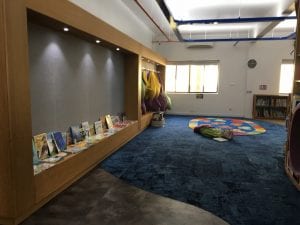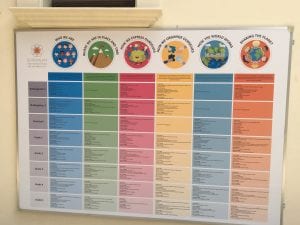New to the world of international schools?
If you have ever wondered about the acronyms being used by international school teachers, this list of international school language will help you prepare for your next interview.
 ADMIN
ADMIN
(Administrator) – Indicates Senior Management / Deputy / Head / Programme (IB PYP, MYP, Diploma) Coordinator*, Section / Grade Level Leader*.
AMERICAN EDUCATION
The American Advanced Placement (AP) programme offers standardised courses to high school students that are generally recognised to be equivalent to undergraduate courses in college. Participating universities worldwide grant credit to students who obtained high enough scores on the exams to qualify.
BRITISH EDUCATION
The National Curriculum in the UK defines the minimum educational requirements for students of compulsory school age (5-16 years). It is organised on the basis of five Key Stages. At the end of each Key Stage, students take assessments to determine the levels they have reached:
- Foundation (Reception/3-5 year olds) – Infant
Key Stage 1 (Years 1-2/5-7 year olds) – Nursery
Key Stage 2 (Years 3-6/7-11 year olds) – Primary
Key Stage 3 (Years 7-9/11-14 year olds) – Lower Secondary
Key Stage 4/GCSE (Years 10-11/14-16) – Upper Secondary
After GCSEs students can opt to enter Key Stage 5 and take A Levels (Years 12-13/16-18 years old).
GCSE (GENERAL CERTIFICATE OF SECONDARY EDUCATION)
GCSEs are the main examinations taken by UK students (ages 14–16) to complete Key Stage Four of secondary education (the equivalent of the first two years of high school in North America). Once GCSEs have been completed, a student is ideally placed to progress to Advanced Level (A-Level), or equivalent programs.
INTERNATIONAL GENERAL CERTIFICATE OF SECONDARY EDUCATION (IGCSE)
The IGCSE is an internationally recognised qualification for school students, typically for ages 14–16 (first two years of high school). It is similar to the GCSE. The IGCSE prepares students for further academic work including progression to ASLevel and A-Level study, Cambridge Pre-U and the IB Diploma Program. The Cambridge IGCSE is recognised as equivalent, grade-for-grade, to the UK GCSE.
ADVANCED LEVELS (A-LEVELS)
Typically a two-year course for ages 16-18 that is the equivalent of the last two years of high school. A-levels are usually taken after successful completion of a previous level, such as GCSEs. A-levels are most familiar in the UK, but are also used in a wide range of international schools worldwide.
CIS ACCREDITATION
CIS is a non-national, non-regionally affiliated organisation and the status of CIS Accreditation confers an international recognition to stakeholders all over the world. The status of international accreditation demonstrates a school’s commitment to high-quality international education to the school community as well as to the outside world: prospective families, educational leaders and teachers as well as universities, embassies, other government departments, and global companies and organisations.
CURRICULUM VITAE
A short summary of your academic and professional history and achievements, ideally no more than two pages long. Within Search Associates, “CV” and “résumé” are terms used interchangeably.
ECIS
Founded in 1965, ECIS (the Educational Collaborative for International Schools) is a non-profit global membership organisation. Founded in 1965, ECIS is a global membership organisation that provides professional development opportunities to its members who are comprised of international schools, individuals and educational organisations.
EFL
English as a Foreign Language
ELL
English Language Learners. Students whose first language is something other than English.
ESL
English as a Second Language. Students whose first language is something other than English are often designated as ESL in order to receive support with their language acquisition goals.
ESOL
English for Speakers of Other Languages. Individuals learning English often speak many other languages. Therefore, ESOL is sometimes preferred over ESL.
GRADE LEVEL TERMINOLOGY:
Search Associates uses American educational terminology as their grade-level standard. The table below compares some common American, British and Australian terminology.

INTERNATIONAL SCHOOL
An international school exists to provide international education to expatriate children living abroad. They try to offer a seamless transition back ‘home’ for families who have an overseas posting. The curriculum may be similar to that of a certain country, e.g. American, British, or Australian, or an international curriculum, such as the International Baccalaureate, or a mixture of these. Over the past few years, international schools have become extremely popular with local students, who attend primarily to learn the language of the international school and to obtain qualifications for employment or university in a foreign country.
NEASC
Accreditation by NEASC (New England Association Of School And Colleges Accreditation) indicates that a school meets or exceeds established criteria within the profession for the assessment of institutional quality through a periodic process of self-study and peer review. An accredited school has the resources to achieve its stated purposes and provides evidence that its students are benefiting from the curricular and co-curricular programs offered at the school.
‘NOT FOR PROFIT’ VS ‘FOR PROFIT’ SCHOOLS
All international schools are profit-making. Some put those profits back into the school in some form or another- ‘not-for-profit schools generally put their surplus into improved facilities and supplies, while for-profit schools also provide dividends to shareholders and owners. Don’t use school stereotypes as a substitute for diligent research on school quality. Take the time and energy to look at specific criteria, at demographics, at people, and to network around the international teaching world. Also investigate the structure of the school, especially its board, the by-laws, and the school charter. How long can board members serve? Does the school require a certain number of board members to be parents of children currently in the school? Does an embassy get to elect a member? How many board members are local vs. expat?
THE INTERNATIONAL BACCALAUREATE
The International Baccalaureate (IB) is an international educational foundation based in Geneva, Switzerland. Founded in 1968, the IB offers three educational programs for children ages 3–19. IB can refer to the organisation itself, any of the following three programs, or the diploma or certificates awarded at the end of the diploma program.
Primary Years Program (PYP)
Designed for students ages 3-11. The program prepares students for the IB Middle Years Program, but is not a prerequisite for it. The subject areas of the PYP are language, social studies, mathematics, science and technology, arts, and personal, social, and physical education. The IB Primary Years Program focuses on the development of the whole child as an inquirer, both in the classroom and in the world outside. Teachers conduct assessments following the strategies provided by the International Baccalaureate (IB) and in accordance with the guidelines outlined in the curriculum model. These guidelines outline what the students should have learned and the assessments are designed to evaluate their understanding and mastery of the material.
Middle Years Program (MYP)
Designed for students ages 11-16, the MYP provides a framework of academic challenge that encourages students to embrace and understand the connections between traditional subjects and the real world and become critical and reflective thinkers. The full program lasts 5 years (middle school and the first two years of high school), although more limited programs can be adopted with permission from the IB.
International Baccalaureate Diploma Program (IBDP)
A two-year program for students ages 16–19, providing an internationally accepted qualification for entry into higher education and is recognised by participating universities worldwide. IBDP students complete assessments in six subjects from the six different subject groups, and complete three core requirements.
SEN (SPECIAL EDUCATIONAL NEEDS)
Children with special educational needs all have learning difficulties or disabilities that make it harder for them to learn or access education than most children of the same age. These children may need extra or different help from that given to other children of the same age.
TRAILING SPOUSE
A trailing spouse is someone who follows their life partner to another city for a work assignment. This person is forced to relocate and as a result, faces numerous challenges that affect both their personal and professional lives. The experience can be difficult and disruptive, causing the trailing spouse to make major adjustments in their daily routines, relationships, and careers. The person may have to give up their own job or find a new one in the new location, find new friends and community, and adapt to a new environment. The trailing spouse often sacrifices their own plans and aspirations to support their partner’s career, making the transition a challenging but hopefully rewarding experience.
WASC
WASC (Western Association Of Schools And Colleges) is one of six official academic bodies responsible for the accreditation of public and private universities, colleges, secondary and elementary schools in the United States and foreign institutions of American origin.
WORK VISA
The process of obtaining a visa is different for each country. Often, you must apply for a working visa through the government in your home country, for the country in which you intend to work. How one country will treat its foreign workers is often reciprocated. For example, if Australia does not have a visa arrangement with citizens from Malaysia, then typically, Malaysia will not offer visas for Australians.
What you need – In general, to apply for a working visa you will need a letter of intent from your employer, a copy of your contract, return airline tickets, a copy of your degree and transcripts (if applicable), your passport, your birth certificate, another form of identification, two passport size photos, and a fee.
Timeframe – Working visas can take anywhere from one day to six weeks to process.
Each country has unique regulations when it comes to issuing valid working visas. To learn more regarding work visas, contact the nearest consulate or embassy of your target country.
If you are lucky enough to have relatives from the EU and you have an EU passport, schools in Europe will find it easier to employ you.
TOURIST VISA
Many teachers are used to travelling on holidays or vacations with a tourist visa, which is only intended for short-term purposes. Some schools in Asia may ask you to arrive on a tourist visa when there are time constraints, promising to secure you a work visa after your arrival. However, this may require you to make a visa run to a nearby country, and the school should bear the cost. Before departure, thoroughly research the visa requirements in the country you’re visiting, especially in Latin America where obtaining a working visa can be challenging. Tourist visas typically remain valid for about 90 days in most countries.
There are several drawbacks to working on a tourist visa:
- It’s illegal, and you risk being fined or deported if caught, with the school in some countries liable for the fine.
- You may have to frequently leave the country to renew your visa every three months in a process known as a visa run.
Now that you are up to speed with international school language, start your research at Search Associates

